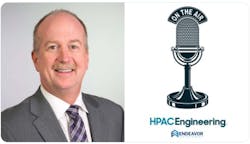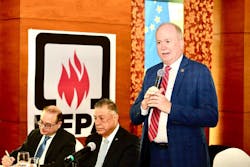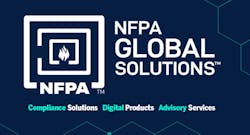Advancing Fire Safety, with NFPA's Jim Pauley
These are busy days for the National Fire Protection Association as it prepares for its annual conference and expo next month in Orlando. So, we feel fortunate that NFPA President and CEO Jim Pauley was able to find the time for us to return as this month's guest on HPAC On The Air.
Pauley is also Chairman of the Board of the NFPA Research Foundation and prior to joining NFPA in 2014, he spent the prior three decades in the electrical and energy industry, working the last several of those years as a Senior Vice President of External Affairs and Government Relations at Schneider Electric. An electrical engineer by training, he has also served the industry in a number of other leadership positions, including as Chair of the American National Standards Institute.
What follows is an edited transcript of our conversation...
HPAC: Jim, welcome back to HPAC 'On The Air.'
Pauley: Thanks Rob. I'm happy to be back. Great to be with you today.
HPAC: I know you've got lots going on, preparing for your big conference in Orlando this June. If you could, please give us a little bit of a preview of that event and tell us what attendees and exhibitors can expect to find there?
Pauley: We are excited once again to be approaching our conference time for NFPA. This is our big game. It's the one time when we can get so many of our stakeholders together in one place, and it's all shaping up to be very heavily attended this year. It's our first time back in Florida after quite a while. We were scheduled to be there during Covid and that was one of the years we did not have the show. So we put Florida back into the lineup and people are expressing that they're quite excited to be able to be going to Orlando. Last year, we had folks from more than 86 countries attend and we're expecting it to rival that this year in international attendance. Exhibit floor space is almost full as they tell me. So again, extremely well attended by the exhibitors and members.
I'm really looking forward to it. We're going to have just some great sessions, about 130 education sessions that'll be spread out across the tracks we're bringing back this year. Also, we have a track of education sessions we'll offer in Spanish this year, some on topics specific for Spanish-speaking audiences. So that's another item that was quite popular before that we have brought back. And then there's our technical session as you ask about on the standards. It's a big year for some of the standards: NFPA 13 on Sprinklers; NFPA 20 on Fire Pumps; NFPA 72 on Fire Alarms; and NFPA 80 on Fire Doors. All are standards that are going to be discussed, and a bunch more at the upcoming tech sessions. That'll be that week. And so it's just a great time. I get really excited this time of year because I love being able to talk to our stakeholders, to our customers at this show. It's just one of the really fun parts of my job.
HPAC: When you say it's a big year for those codes and standards, does that mean that they're coming up for renewal or revisions? What makes it a big year for them?
Pauley: There's quite a few standards in what we call 'in cycle.' It's a process where a number of our standards have finished with their technical committees, and then we open that up to everyone. We open all the standards up for what we call a time period of "a notice of an intent to make a motion." And that's where people can say, "Hey, I'm going to come to the floor at the annual meeting or at the annual tech session and I'm going to raise this particular issue."
When they do that, it gets on the agenda then for the session that's coming up in June. Standards that don't receive any of those notices actually go right on through the process. So we have a series of standards that did not get any notices, which means people were pretty happy with what the technical committees had done.
Those standards will go on through the Standards Council process and then ultimately be issued earlier. They still had to wait on the annual meeting. But the standards I mentioned, 13, 20, 72, 80 and a number of others, all have notices of intent to make a motion. And so that means somebody has said, "there is something I want to talk about at this annual tech session." And they will show up to do that. It's the great part about the process that we do.
I always say there are only 300 people in the world who can't participate in this process, and those are the 300 people who work for NFPA. Everybody else, anybody, anywhere in the world, can participate through public input, through comments, through attendance at the tech session, through making motions. It is just an extremely open and transparent process for everybody.
HPAC: That sounds like it should be energizing on many levels. Speaking of energy, NFPA just made another big announcement. This spring, you launched a new company, NFPA Global Solutions, which includes NFPA Global Advisors, I believe. Could you explain a bit about that effort and what the association hopes to accomplish with it?
Pauley: Well, I think probably all of your HPAC Engineering audience knows that NFPA has always been a 501(c)(3) nonprofit. NFPA has existed as a public charity for all of these years, and as with almost any organization or business, as your stakeholder base begins to expand, they begin to ask you for other things that you can potentially do. But a number of those things you can't necessarily do under the banner of a public charity.
So, NFPA Global Solutions is a fully owned, for-profit entity underneath the NFPA umbrella. But it's completely separate from NFPA. It has its own staff. It has its own board of directors and they're really going to focus on three areas. One part of those are compliance solutions. A lot of people looking for NFPA now will be able to come to NFPA Global Solutions and say, "Hey, what about this particular product? Can it be used in these applications? Does it meet the requirements of the standard and so forth?" We call that the testing, inspection and certification market.
The second part of that is really focused on digital tools for our customer base. So, when you think of the engineers, you think of the installer community, and all those different areas we serve. Are there digital tools that we could be offering as NFPA Global Solutions that could help people to do their jobs better? And so you can think of that in terms of software on the NFPA side. We already did that a bit with NFPA Link, which is the access to our codes and standards platform along with several other things that it does for our users.
And then the third area you mentioned is a business within NFPA Global Solutions called NFPA Global Advisors. And this one's interesting, I think, in two aspects.
One is, regardless of what we have said, people try to interpret their own way (what NFPA is). It is not a consulting engineering company. It is not a fire protection engineering company. For decades, NFPA has been asked to work with governments all around the world to help. It is often in a standards context initially and often saying, we need you to help us with safety in our country. And 'NFPA proper' was always just about the standards context of that.
Back in 2018, we introduced the NFPA Fire & Life Safety Ecosystem, and graphically, we show it everywhere. It's eight cogs of what we say are important in order for safety to work. And they include things like government's responsibility, codes and standards, reference codes, investing in safety enforcement, appropriate training for people, public education, a good first responder network. Those things make up the ecosystem.
And so what NFPA Global Advisors is about is taking that ecosystem and working with governments to help them create their system of safety. It's not designing buildings. It's the things that governments really need to put in place to be able to create that entire system.
I've sat all over the globe and I was in one particular country and very directly, the minister of government there said to me, "We get the codes and standards piece. What we need your help with is how do we actually put all of the pieces in place as a government to make all of this work? How do you put an enforcement system in place? How do you make sure people have appropriate training to be able to do the work?"
So that's what NFPA Global Advisors is about. And as we do that, it's going to expand the need for more engineering services that consulting engineering firms offer. It's going to expand the need for installation services that installation firms offer. So it really is going to the old saying, "A rising tide raises all boats." That's what the ecosystem is about. How do you elevate safety so that all of those things in the safety ecosystem get utilized better and more effectively.
HPAC: Does the use of the word 'global' for both solutions and advisors mean that NFPA anticipates more international use of these products than domestic use?
Pauley: So, that's a really interesting question. I've been at NFPA now 10 years, and people would always ask me, 'What was your biggest surprise when you came to NFPA?"
For 30 years, I've been a member, a customer, a technical committee member. I was on the standards council for NFPA for 14 years and I even chaired that. So I knew NFPA well, but what surprised me, and I knew NFPA did things internationally. But what surprised me is how big the reputation of NFPA is internationally. And so, yes, directly I do expect through NFPA Global Advisors that there will even be more international focus. But you also have to remember that the fire problem doesn't know any geographical boundaries.
So our mission, our vision is about being the leading global advocate for the elimination of death, injuries, property damage and economic loss. So I think yes, it's going to drive more global action. People are looking for these solutions globally.
HPAC: 'Global' also makes me think of the pandemic, of course, which affected every industry. With the rise of remote work and the increase in unused office spaces, mechanical systems were impacted dramatically for extended periods. How has all of that impacted fire protection?
Pauley: That's been interesting. It seems to have corrected itself back to some sense of normalcy as it was in pre-pandemic. In other words, people are getting inspections done, people are doing the work that needs to happen. But I think your whole point about office buildings and what happens to those still remains a question. One of the things that we're seeing quite a bit is converting office buildings into housing in those empty spaces. Now, as you can imagine, that opens up all sorts of sets of issues that you've got to deal with when you have that radical of an occupancy change. But people are working their way through that.
The other big thing that I think was really pandemic-related, we've seen the interest in remote inspections really increasing. And so we did a standard NFPA 915 on Remote Inspections that talks about how you should be doing those, how you do record keeping, etc. And we're seeing that really is on the rise because, like so many things during the pandemic, people saw that it could be done, and in a lot of cases, it was more effective and more efficient. And I think that's going to continue on. The more Internet of Things (IoT) connects things like fire pumps and sprinkler systems and all that monitoring into building systems, the more I think we'll see all of this activity happening.
######
For the rest of this podcast, including more on technology and the future of building fire protection, please listen in at hpac.com/members/podcasts.
####
To listen to previous 'HPAC On The Air' podcasts, visit our Members Only page.



